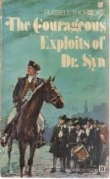
Текст книги "Red Jungle"
Автор книги: Kent Harrington
Жанр:
Триллеры
сообщить о нарушении
Текущая страница: 12 (всего у книги 20 страниц)
“It means I can’t go with you. Not right now,” he said. He watched the customs man take her passport and walk towards the gate. The other bodyguard, holding her ticket now, came up to Russell and nodded.
“Listo?” Ready? the bodyguard said to him.
“You have to go with him. He’s going to go with you to Miami, just in case. I was worried that on the plane—someone —I don’t know, I just was worried. This way, you’ll be all right,” he said. “He’ll watch over you all the way there.”
“Russell, please don’t leave me. I love you.” Katherine was looking at him, tears in her eyes now. He hadn’t expected that. He thought she would get angry, but not that. “I love you. I know you love me. She’s not good for you. I want to be your wife. She can’t ever do that, Russell, can’t you see that? She belongs to him. Why can’t you see that?”
“I’m sorry I lied to you,” he said. “Don’t you see, I had to. You weren’t going to leave.” He nodded to the men. One of them picked up her suitcase. She started to sob. He couldn’t stand it, and turned around.
“Please . . . Russell! Please.” He heard her sobbing, and kept walking. There were all kinds of people coming for the red-eye to Miami. He forced himself to keep walking across the busy, well-lit concourse, and then out the big sliding glass doors and out into the night, which smelled of diesel and decaying city. The smell hit him in the face. He noticed that Selva’s backup car was gone. He stopped for a moment by the taxi stand. He heard the drivers asking him if he wanted a taxi.
“Taxi, Señor?” He wanted desperately to turn around. Somewhere in his gut, he knew Katherine was right. Beatrice wasn’t the right woman. But he couldn’t help himself.
“Taxi, Señor?” He closed his eyes for a moment and remembered Katherine the way he wanted to remember her: the way she had been that first morning driving down to the coast, her hands on the steering wheel, so sure of herself and her place in the world.
“No, thank you. Not tonight,” Russell answered, and walked on.
TWENTY-TWO
There’s going to be a devaluation of the quetzal. I just heard,” Antonio said.
They had all met at De La Madrid’s house, the entire would-be cabinet, including Senator Valladolid. The senator was scheduled to be De La Madrid’s foreign minister. Probably a mistake, Russell thought, glancing at the old man.
“Are you sure?” Russell said.
“Yes. My brother just called.” Madrid’s brother was head of the Bank of Guatemala. “It gets worse. It’s going to be eight to one,” Antonio said, looking at him.
“Jesus!” He was still reeling from leaving Katherine at the airport. Russell went to a space on the couch and sat down between the would-be minister of the interior and a young woman who was slated to be minister of defense. If Madrid was elected, she would be the first woman in Guatemalan history to hold the post.
Russell didn’t think they had a chance now. The political situation—if there was a devaluation—would be chaotic at best.
“Why now?” Russell asked as he sat down.
“The government can’t make the payment on a dollar loan coming due next week—five hundred million,” Antonio explained. “They don’t have the reserves, and they can’t borrow any more because of the coffee crisis. The World Bank will provide a bailout package, but only if we submit to an IMF restructuring. Devaluation of the currency is the center-piece of the plan, of course. It’s supposed to make our coffee more competitive.”
“The whole country is bankrupt!” Senator Vallodalid said cheerfully. “Pretty soon we’ll be paying them to buy our coffee.” He raised his glass and smiled at Russell. He was drinking scotch out of a Waterford tumbler and wore a pink cravat. He looked like he was going to Cap Ferret, not facing a political and financial crisis.
“We were wondering what you thought we should do, young man? You seem to know all about these financial matters,” Valladolid said. “I just think they want cheap coffee.” All the men and the woman shook their heads in agreement. “After all, Europe and America are having a recession,” the senator said. “They want a bargain.”
“It’s criminal. It means we get even less for our coffee,” the young woman next to him said. She was a young human rights lawyer whom Madrid had selected because her good liberal credentials would steal votes from the more radical left elements. “It means the price for hard bean superior would be. . . .”
“About ten dollars a kilo,” Russell finished her sentence.
“That’s impossible. It can’t be allowed,” Madrid said.
“The unemployment rate will go to fifty percent if the IMF gets its way,” Russell said. “It will open the door again to the Communists.”
The devaluation would create a financial death spiral, Russell knew. It was essentially the same thing that had just happened to Argentina. Once the international currency speculators got wind of the IMF plan, they would drive the currency down even further. The government’s bonds would be worthless, and interest rates would skyrocket. Dollar reserves, so crucial to any modern banking system, would leave the country almost immediately as the rich pulled their dollars out of the country’s banks.
“My brother says that President Blanco has already approved,” Madrid said.
They were all looking at Russell. None of them had trained as economists.
“There has to be a solution,” Madrid said. “We can’t let the country slip away again.”
There was silence. Everyone in the room, including Russell, had lost someone in the war.
Russell looked at the faces in the lamplight. They were frightened. No one wanted another Argentina. No one wanted the Communists to come back as a political force. No one wanted more violence.
“The government could declare a debt payment holiday while they try to renegotiate with the creditors. Then maybe they could build reserves, defend the Quetzal. But if you declare a debt holiday, Guatemalan bonds are going to collapse. And new loans will be impossible to get, because the IMF will blacklist you. You can’t win…. There is no solution. The IMF and the World Bank hold all the cards. On the other hand, if they devalue there will be massive inflation and unemployment. I think the war will start all over. The reds are already making noises,” Russell said. “They’re probably talking to Castro in Havana right now. It’s their big chance to make a comeback. They’re probably praying for a devaluation.”
“It’s what the Americans want, isn’t it?” Valladolid said. “I mean, they want Selva to win. They don’t care if there’s political chaos. In fact, I think it serves their purpose. When has peace and prosperity served the colonists?” the old man said. “We’re finished. We were finished a long time ago.”
“Why don’t you stop blaming the fucking Americans for everything? They didn’t borrow the fucking money from Citibank and then steal it. They didn’t send it to accounts in Switzerland. And they didn’t stop you from investing here instead of sending your money out of the country for the last hundred years,” Russell said angrily. “That’s the problem with you people. You haven’t taken responsibility for your own damn country. Where are the factories, the highways, the railroads? You’re as much to blame as the Americans are, for Christ’s sake!”
The young woman lawyer stood up angrily. Madrid told her to sit down.
“He’s right,” Valladolid said. “He’s right. All of you have bank accounts in Miami. I know I do. That’s the horrible truth. We, the class that mattered here, when did we really believe in the country? The boy is right.”
Russell poured himself a glass of wine and went to the window. He felt ashamed of his outburst. The others started to talk about party politics. He listened for a while. Their internecine squabbles seemed ludicrous in the face of the economic crisis that would sweep them all away.
It was late. He drained his second glass of wine and walked back to the couch. Everyone had left but the Senator and Madrid. There was no consensus on how to face the devaluation. It looked as though Madrid’s coalition would break apart. A privatization of the telephone company, which had been the centerpiece of their platform, seemed impossible now. Who would want to buy it now, with the country in chaos?
“There’s one solution,” Russell said, coming back to the couch.
“Well, go ahead boy, don’t keep us in suspense,” the senator said.
“A coup,” he said. “We get rid of Blanco and take power. Ignore the IMF’s suggestions. Do it before the election. Then you privatize the telephone and the water and electricity companies. With the money you get, you defend the quetzal. It’s a gamble, but it might work. The international capital markets will love the privatization, and might just not sell the country’s debt off once they hear the plan. They certainly won’t care much about the coup, given how bad things are anyway. As long as we make it clear the new government is pro-business. . . . Interest rates might actually go down,” Russell said. “It’s a big gamble. But you’ll have to move quick. President Blanco has to go. And the army has to be brought to heel.” The two older men looked at him, open-mouthed.
“It might work, Rudy,” Madrid said finally. “Jesus . . . it just might work. We’ll hold elections in a year after the coup.”
“The embassy will come to Blanco’s defense,” Valladolid said. “But I like it. Blanco is a prick. I never liked the man,” the senator said.
“I think the telephone company alone is worth maybe a billion dollars. Let’s say in four months, you have five or six billion in the treasury. That’s enough. You wouldn’t have to devaluate,” Russell said. “You could start paying on the defaulted loans.”
“All we have to do is overthrow the military government,” Rudy said. “It’s child’s play . . . really!” They all laughed.
“Of course—because it’s Guatemala—they’ll try to kill us first,” Madrid said. “Because nobody in this fucking country can keep a secret!”
“We’re all like old ladies,” Rudy said, slapping Russell on the back, clearly excited by the idea of a coup.
“And what about Selva?” Madrid said. “He’s not just going to lie down and take this coup. He expects to win the election.”
“No. He’ll be a problem,” Russell said. “He’ll have to be arrested. . . . And I suppose sent out of the country. Or put in jail.” Russell looked at the old senator, who had sat back down. Valladolid was looking at Russell differently now.
“That would be very unfortunate for his wife and children,” Valladolid said cryptically, looking at Russell.
“Yes. It would, but these things happen in politics,” Russell said.
“You know if we decide to do this, we might all be killed,” Madrid said, looking at him. “You realize that, young man?”
“Yes. But we might also save the country from a civil war and financial collapse,” Russell said.
“Jesus. I love young people!” Rudy said. “They always are ready to die. Personally, I love life too much, I think. The older you are, the more you love it.”
Russell looked at Madrid.
“He’s right, Rudy,” Madrid said. “We have no choice now. Do we?”
“No, I suppose not. But I certainly hope we don’t have to die. I suppose we can’t do this from Miami, young man?”
“No,” Russell said, and smiled. “You can’t do it from Miami.”
“I didn’t think so. It was just an idea.”
“Well, welcome to the government,” Madrid said, looking at Russell. “I’m appointing you to the provisional central bank as of this evening. You’ll have to run the privatizations. . . . And help us plan this coup.”
“Me?”
“It was your idea,” Madrid said. “Anyway, we can trust you, I think. I don’t even trust Rudy.”
“Young man, if we manage to get ten billion dollars in the treasury, you won’t even be able to trust God himself,” the senator said.
•••
Russell cut the engine. The boat, a brand new Boston whaler, glided through the brackish water of the lagoon in Tilapa. Beatrice suddenly yelled his name with delight. She was wearing a sky blue bikini. She’d taken off her top, and her small breasts looked very white in the bright sunlight. Her cry startled a group of parrots. The birds exploded from a tree top on the far bank. The bright green birds, flying just over the water, headed down the lagoon.
“There! There they are!” she yelled. Russell had come down for the Selvas’ party in Tilapa. Beatrice sat in the bow, clutching the gunwales. Alone, they’d been hunting for crabs in the lagoon that ran behind the beach.
“Stop here!” she said. “Look. There. Do you see them?”
Russell looked down over the little boat’s gunwale.
“See. Blue crabs,” she said. She turned around. She’d never looked more beautiful. He held on to the gunwale and tried to look into the blue-green water of the lagoon. On the other side of the narrow spit of land behind him, he could hear waves hitting the unseen beach. “Can’t you see them?” she said.
It made him feel uncomfortable that she’d taken off her top; there were other families on the spit for the weekend, and they couldn’t be sure that they wouldn’t be seen. He had asked her not to, but she’d ignored him. It was as if she wasn’t hearing him, or as if she were at times alone. Beatrice had spoken to herself twice as they went up the lagoon. At first he thought she was speaking to him, but when he realized that she was talking to herself, it was as if he’d caught her doing something unnatural, and she had turned away.
“Yes, I see them,” he said finally. He’d had to put on his other sunglasses, the very dark blue ones. With their dark tint, he could make out the strange exotic crabs on the floor of the lagoon. They were a species that lived only in central America, in the mangrove swamps along the Pacific. He saw a group of crabs scurrying over the submerged roots of the mangrove trees, ten feet under the water. The crabs, smallish, were dark blue, the color of steel when you heat it up.
“They’re beautiful,” he said, and looked at her. “Are you all right?” She’d pulled her hair out of a pony tail.
“Of course I am. Why?”
“You haven’t answered me about Carlos. I asked you twice when he was expected.”
“This afternoon,” she said vacantly. “I thought I told you. He’s flying in. . . . The helicopter.”
“Put your T-shirt on,” he said. “Please.”
“Why?” She turned back and looked down into the water. “I’m going in to get one.” She dove over the gunwale of the boat before he could stop her.
“Jesus.” The lagoon was dangerous; sharks came in from the ocean, and there were alligators. He quickly looked up into the mangroves, looking for splashes. He’d brought his shotgun and reached for it, slinging it over his naked shoulder, and then saw her as the water cleared. He couldn’t stop himself from smiling, or from wanting her. The sight of her slender figure underwater, the blond hair trailing. “Jesus,” he said again. “Jesus, you’re so fucking beautiful.” He saw her grab at something, then swim towards the surface, her shoulders moving aggressively. She grabbed the gunwale and tossed a crab into the boat. It landed at his feet.
“Are you going to help me? We can have them for lunch. There’s hundreds down here,” she said excitedly. In the sunlight the crab’s color was darker, almost black. The crab struggled to climb the side of the boat and escape.
“Beatrice. There’re sharks, for God’s sake!”
“I know. Come on before they get here,” she said.
He knew he shouldn’t go into the water with her, that it was unsafe, that someone might come along and jump them, or tell someone the general’s wife was swimming topless with the American. He un-slung his Mossberg and laid it down next to the red gas tank. He glanced for a moment at the crab, at the way it struggled violently, its jewel-shaped claws desperately opening and closing. Already the creature was being affected by the sun, its shell already dry-looking. Russell dove into the warm, dangerous water.
Tilapa was really just a spit of land—a long island between the ocean and the lagoon—studded with the vacation houses of the very rich, tucked away on Guatemala’s untouched Pacific coast. Russell thought it was one of the most beautiful places he’d ever been. His mother had owned the Selva house, in fact. The general had bought it from his aunt after Russell’s mother died.
Russell remembered the house very well, from his childhood. He sat in one of the compound’s several guest cabanas. The worn red-tile floor was sprinkled with white sand. He and Beatrice had tracked it in from the beach. The sun, fierce at mid-day, shone through two small windows high on the wall. A new fan with wooden blades turned swiftly through the warm air, making a pleasant noise that mixed with the sound of the ocean.
“I want to make love,” Beatrice said. He’d let her come into the cabana only because she said she wanted to talk. He’d left the door open so that the maids could see what was going on.
He glanced out into the yard. One of Beatrice’s children was playing in the large enclosed backyard behind the main house.
They’d made love in the bottom of the boat. He’d taken the crabs they’d caught and wrapped them in their towels. It had been a crude and unsuccessful trap. At the end, when he’d been rocking her, there had been the sound of the water as they drifted, and the sound of sea birds and the heat of the morning sun on his legs and chest. It hadn’t made any difference when he felt one of the creatures bite his leg. He’d simply stopped for a moment, reached down and batted the crab to the back of the boat, noticing when he did that all the crabs had managed to push their way out of the towels.
Laughing, he told her their lunch was getting loose. She said she didn’t care, her face tense with the sex. They were sitting so that she was astride him, his hands exposed to the crabs. She must have seen them as they worked their way free, but she wanted to keep riding him, making the small boat move in the calm water. He watched the sweat run down from under her arms, the red strap marks clear where she’d been sunning herself the day before, when she’d been alone with the kids. He noticed the lovely smallness of her breasts. He could feel the nudging of the crabs as they moved along his legs.
He’d come like the shimmering of the eleven o’clock swampy sunlight on the lagoon, fast and electric, In small boat-rubbing spasms, her lips on his neck, the crabs on his hands, their cold dying creature-touch odd and pleasurable, like the lovemaking. He heard her laughing and saw small puddles of sweat on his stomach as she came. He could smell gasoline, see the black rubber hose that led to the outboard motor from the gas can, hear the silence of her lifting herself. She was so, so deliberate and sexual in the way she got off him, loving him even while she was finally leaving. She touched him there, with her hand, her wet hair lying on her shoulders, thick-looking. He would never have another time like that with any other woman. Nothing would ever be like that again. It was as if the whole world had shrunk down to just the inside of this little boat, and it had been making love with them, the lagoon going breathless and contracting and then releasing with them. He told her he loved her, that he couldn’t live without her.
He’d said it while he’d gathered up the crabs and tossed them into the center of the expensive pink beach towels she’d brought for them. She’d listened quietly. He told her he wanted her to leave Carlos, that he wanted to take her and the children away, maybe to Europe, that he could afford to take care of them, that he was doing something that would make it possible.
She’d sat there naked on the bench as the ocean’s current pushed them into the shade of the mangroves, where huge roots, big ones like claws, hooked into the water.
He told her he would do anything to have her, that he had to have her forever, and he promised to take good care of her. There was nothing else he wanted in the world but her, he said, both of them in shadows now. He spoke at the end standing up, looking at the crabs as they silently struggled inside the knotted towel. He looked into the mangroves, their black trunk-shapes a delicate and seemingly endless abstraction.
“Will you come with me? When I’m ready?” he asked. “That’s all I want to know.”
“I’m scared, Russell. I’m not brave,” she said. “I’m scared for the children. You know what he will be like if I leave him. You haven’t seen him when he’s angry.”
“I don’t give a fuck what he’s like,” he said. “This isn’t about Carlos.”
“He’s murdered people, Russell,” she said. “Near here. He’s taken people out and shot them. On the road to Tilapa.” She looked away into the swamp, where they said big jaguars lived and hunted at night. The people here said that they were the biggest jaguars in all Central America. Sometimes, people said, they would swim out to canoes and drag fishermen into the swamp.
“All right, he’s killed people,” Russell said. “Do you want your children living with a murderer?”
“I don’t know what I want. I want you, but I don’t know, Russell. I don’t know about taking the children from him; it seems so unfair, doesn’t it? He loves them. He’s a good father. And they have a place here. What will their place be with us?”
“I promise you, I’ll have plenty of money,” he said. “If that’s what you’re worried about.” He knew it was. He knew she didn’t want to live her life the way she had lived it before. She’d been poor, the child of a single working mother.
“It’s not the money, it’s their country. They’re Guatemalans. They speak Spanish. They don’t speak English that well, Russell. Do you understand? They’re not English children, not at all. I’m English, but they aren’t.”
“Then leave them,” he said, pulling at the motor. “We’ll have our own.” And he meant it.
He had let her come into his cabana only because she said she wanted to talk. But she’d gone into the bathroom, shut the door, and showered. He had sat on the bed waiting for her to finish, his sunglasses still on, nervous that she was again doing something she shouldn’t be. She shouldn’t be in here using his shower. The maids had looked at one another when they’d stopped to talk in the courtyard, handing off the crabs they’d caught to the cook. He heard the shower running and wondered what the hell he’d say if anyone came to the door looking for her.
“You’ve got to go,” he said when she came out. She had wrapped herself in a fresh white towel. “Now,” he said. “Please. I’m serious.”
“I can’t do it,” she said. “I can’t leave the children. Don’t ask me to do that. But you can’t ever leave me, either.”
“He’ll find out, Beatrice. Look at you, you’re in my room showering. The maids are talking. We made love today and could have been seen by anyone out there. He’ll kill me when he finds out. It’s only a matter of time.”
She walked to the cabana door and kicked it shut with her foot. It slammed shut. He went immediately to open it again, but she stopped him. She dropped the towel. Even then, afraid and angry, she still took his breath away.
“Stop it, Beatrice. They’re just outside,” he whispered.
“I can’t live without you. You don’t understand!” she said. “He can’t make love.”
“What?”
“Carlos. There’s something wrong with him lately.”
“What are you talking about?”
“I don’t know what it is.” There was a knock on the door.
“Señora?”
“Sí,” Beatrice said. “Sí, dígame, Carmen.” Russell recognized the children’s nanny’s voice on the other side of the door.
“Your cell phone, señora . . . the general’s mother,” the nanny said.
“Go get the phone and bring it here to me,” Beatrice said, calling to her. She bent down, picked up the towel and walked towards him. He had no idea what they were going to do now. She put the towel around both of them and held him. He felt his pants get wet from touching her.
“I want to marry you. Do you understand? I’m taking you away. I don’t care what you say.”
“All right,” she said. “All right . . . all right.”








